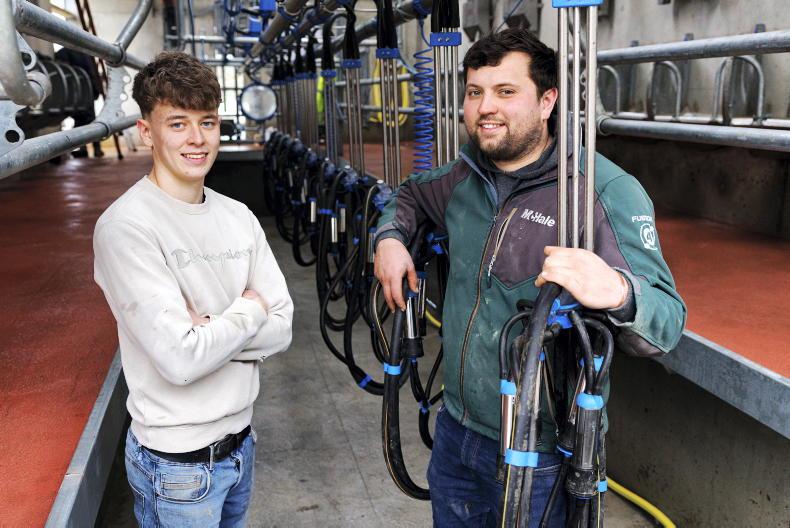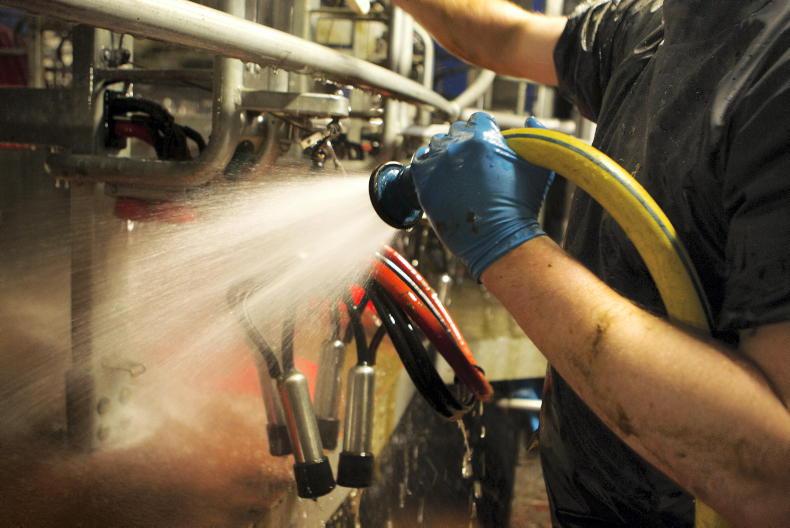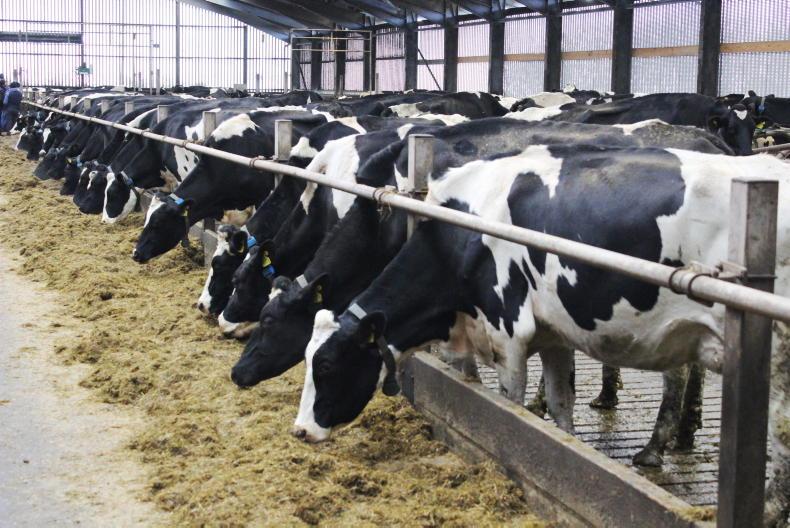The debate around the growth in the dairy industry and how processing capacity has been funded by milk suppliers has taken a new twist recently with the Lakeland peak penalty announcement.
The message to Lakeland suppliers is ‘we’ll take your milk, but we’ll pay you a lesser price for it’. The move is seismic and shakes the foundations of the co-op principle. Do Lakeland suppliers care? Do they realise what is happening? It begs the question is this the biggest own goal Lakeland has scored after a number of wins on the road?
The move flies in the face of so much. It goes against sustainability at farm level. It goes against the financial returns to farmers. It goes against building a vision for a co-op and a roadmap for the future. It is different to what other co-ops have done in terms of shareholding and ownership. It begs the question, why do this?
Milk price paid to farmers or business expenses such as investment in steel must come from the market or from co-op profits. Investment in processing capacity is effectively a business expense so if it can be minimised then it helps. For the last two weeks, Lakeland suppliers have been ringing me asking why is Lakeland using this peak penalty initiative to further flatten an already flat curve? Has the co-op spent too much money already in Bailieborough? Is it because it can get a right good price for winter products? Is it because it is under financial strain? Is it because it wants to sell more inputs? Is it because it is processing so much milk for Glanbia? Is it because it wants to shove it up to Teagasc and tell Teagasc and the Minister for Agriculture they are wrong on what they are preaching about?
Lakeland management have said “no” to all these questions. The co-op can’t get a price premium for products out of season, it is not under financial strain, Bailieborough investments are going well, and agribusiness or input sales to farmers is a relatively small part of the overall business. It does process milk for Glanbia, however Glanbia also processes milk for Lakeland.
So what is happening?
From the outside looking in, essentially Lakeland is looking to gather up funds from a subset of its suppliers. This will help the Lakeland management team gather a pot of funds, maybe in the region of €4m to €5m per year, indirectly create additional processing capacity, and ultimately tie new entrants into an all-year-round milk supply pattern irrespective of what land asset they have. It paints all suppliers with the one brush.
On the milk curve flattening question, the simple economics are yes, Lakeland might have a cent or two from better processing efficiency, but, the farmer producing the milk has a higher cost of 4-5c/l for this out-of-season milk. Hence, in the round for member milk suppliers it doesn’t make sense.
Down through the years, the other processors (see map) that have increased processing capacity have had various engagements with shareholders over the future of the business. Dairygold Co-op probably asked suppliers and shareholders to invest more than any other co-op. At the time it was contentious. There were deferred payments, compulsory shareholding, revolving funds and voluntary loan notes on the table. Ultimately, it took some money from suppliers short-term to allow management carry out an investment roadmap to allow the co-op to grow and evolve.
At the time many questioned should new entrants get in for free? The writing was on the wall – new entrants were going to start milking, and many were starting with a minimum of 100 cows. Many suppliers milking less than that number probably felt disgruntled that these new entrants could sweep into town, pay up a minimum shareholding over a number of years and get access to the processing capacity they had paid for over the previous 40 years. However, the reality soon dawned that there are shareholders and milk suppliers always leaving the co-op. Without renewal the model won’t work. A co-op needs efficient new entrants to keep processing capacity efficient and allow it grow. So in summary yes, there was a cost to the Dairygold supplier to build up his/her shareholding, which of course can be redeemed but also achieves a dividend. In the overall scheme of things, for the average supplier, it wasn’t a game changer. Dairygold management went one-to-one with each supplier to discuss a roadmap and outline the co-op strategy and try and align it to the supplier. Has this happened in Lakeland?
The debate over the seasonal milk curve was also hot at the time. However, the farmer directors in the majority of the co-ops held sway and negotiated with management that ultimately it was the best for the farmer members to produce milk supply in line with the milk curve in order to increase dairy farmer sustainability. In a world where sustainability is going up the priority list for milk suppliers and dairy co-ops, at home and abroad, it’s unfortunate to see Lakeland directors taking the co-op in the opposite direction.
If nothing else, in Dairygold there was a debate led by directors and regional committee members that road-tested the strategy. That same process is missing in Lakeland.
Some still wrongly hold the view that once you go above the Galway to Dublin line you should be producing milk all year round despite the fact many Lakeland suppliers can grow and use more grass than many farms in the south. Also, the Lakeland strategy ignores the fact that out-of-season milk is not returning any more profit to the business and costing the farmer financially and environmentally more to produce in a world where we are trying to reduce inputs.
I remember well the Mallow town hall meeting with hundreds of Dairygold suppliers questioning the investment strategy of Dairygold management. A large number of milk suppliers and shareholders disagreed with the investment train, others put faith in management. Either way, there was serious engagement and discussion as ultimately it’s milk suppliers who pay for the processing capacity and hopefully their ancestors will be in place in 100 years’ time when we are all long gone.
If this policy was announced down south, there would be a revolt by shareholders and the board of directors would have been held to account. It’s both interesting and disappointing to see the same dynamic not in place in the Lakeland region. Is this apathy a growing trend signalling the demise of farmers’ or members’ interest in the business? I hope not.
Lakeland peak penalty in stark contrast to other co-ops and flies in the face of sustainability.Lack of discussion and debate by Lakeland milk suppliers interesting and disappointing.Lakeland decisions might mean short-term business gain, however ultimately long-term, it means Lakeland milk suppliers lose out.
The debate around the growth in the dairy industry and how processing capacity has been funded by milk suppliers has taken a new twist recently with the Lakeland peak penalty announcement.
The message to Lakeland suppliers is ‘we’ll take your milk, but we’ll pay you a lesser price for it’. The move is seismic and shakes the foundations of the co-op principle. Do Lakeland suppliers care? Do they realise what is happening? It begs the question is this the biggest own goal Lakeland has scored after a number of wins on the road?
The move flies in the face of so much. It goes against sustainability at farm level. It goes against the financial returns to farmers. It goes against building a vision for a co-op and a roadmap for the future. It is different to what other co-ops have done in terms of shareholding and ownership. It begs the question, why do this?
Milk price paid to farmers or business expenses such as investment in steel must come from the market or from co-op profits. Investment in processing capacity is effectively a business expense so if it can be minimised then it helps. For the last two weeks, Lakeland suppliers have been ringing me asking why is Lakeland using this peak penalty initiative to further flatten an already flat curve? Has the co-op spent too much money already in Bailieborough? Is it because it can get a right good price for winter products? Is it because it is under financial strain? Is it because it wants to sell more inputs? Is it because it is processing so much milk for Glanbia? Is it because it wants to shove it up to Teagasc and tell Teagasc and the Minister for Agriculture they are wrong on what they are preaching about?
Lakeland management have said “no” to all these questions. The co-op can’t get a price premium for products out of season, it is not under financial strain, Bailieborough investments are going well, and agribusiness or input sales to farmers is a relatively small part of the overall business. It does process milk for Glanbia, however Glanbia also processes milk for Lakeland.
So what is happening?
From the outside looking in, essentially Lakeland is looking to gather up funds from a subset of its suppliers. This will help the Lakeland management team gather a pot of funds, maybe in the region of €4m to €5m per year, indirectly create additional processing capacity, and ultimately tie new entrants into an all-year-round milk supply pattern irrespective of what land asset they have. It paints all suppliers with the one brush.
On the milk curve flattening question, the simple economics are yes, Lakeland might have a cent or two from better processing efficiency, but, the farmer producing the milk has a higher cost of 4-5c/l for this out-of-season milk. Hence, in the round for member milk suppliers it doesn’t make sense.
Down through the years, the other processors (see map) that have increased processing capacity have had various engagements with shareholders over the future of the business. Dairygold Co-op probably asked suppliers and shareholders to invest more than any other co-op. At the time it was contentious. There were deferred payments, compulsory shareholding, revolving funds and voluntary loan notes on the table. Ultimately, it took some money from suppliers short-term to allow management carry out an investment roadmap to allow the co-op to grow and evolve.
At the time many questioned should new entrants get in for free? The writing was on the wall – new entrants were going to start milking, and many were starting with a minimum of 100 cows. Many suppliers milking less than that number probably felt disgruntled that these new entrants could sweep into town, pay up a minimum shareholding over a number of years and get access to the processing capacity they had paid for over the previous 40 years. However, the reality soon dawned that there are shareholders and milk suppliers always leaving the co-op. Without renewal the model won’t work. A co-op needs efficient new entrants to keep processing capacity efficient and allow it grow. So in summary yes, there was a cost to the Dairygold supplier to build up his/her shareholding, which of course can be redeemed but also achieves a dividend. In the overall scheme of things, for the average supplier, it wasn’t a game changer. Dairygold management went one-to-one with each supplier to discuss a roadmap and outline the co-op strategy and try and align it to the supplier. Has this happened in Lakeland?
The debate over the seasonal milk curve was also hot at the time. However, the farmer directors in the majority of the co-ops held sway and negotiated with management that ultimately it was the best for the farmer members to produce milk supply in line with the milk curve in order to increase dairy farmer sustainability. In a world where sustainability is going up the priority list for milk suppliers and dairy co-ops, at home and abroad, it’s unfortunate to see Lakeland directors taking the co-op in the opposite direction.
If nothing else, in Dairygold there was a debate led by directors and regional committee members that road-tested the strategy. That same process is missing in Lakeland.
Some still wrongly hold the view that once you go above the Galway to Dublin line you should be producing milk all year round despite the fact many Lakeland suppliers can grow and use more grass than many farms in the south. Also, the Lakeland strategy ignores the fact that out-of-season milk is not returning any more profit to the business and costing the farmer financially and environmentally more to produce in a world where we are trying to reduce inputs.
I remember well the Mallow town hall meeting with hundreds of Dairygold suppliers questioning the investment strategy of Dairygold management. A large number of milk suppliers and shareholders disagreed with the investment train, others put faith in management. Either way, there was serious engagement and discussion as ultimately it’s milk suppliers who pay for the processing capacity and hopefully their ancestors will be in place in 100 years’ time when we are all long gone.
If this policy was announced down south, there would be a revolt by shareholders and the board of directors would have been held to account. It’s both interesting and disappointing to see the same dynamic not in place in the Lakeland region. Is this apathy a growing trend signalling the demise of farmers’ or members’ interest in the business? I hope not.
Lakeland peak penalty in stark contrast to other co-ops and flies in the face of sustainability.Lack of discussion and debate by Lakeland milk suppliers interesting and disappointing.Lakeland decisions might mean short-term business gain, however ultimately long-term, it means Lakeland milk suppliers lose out. 







SHARING OPTIONS